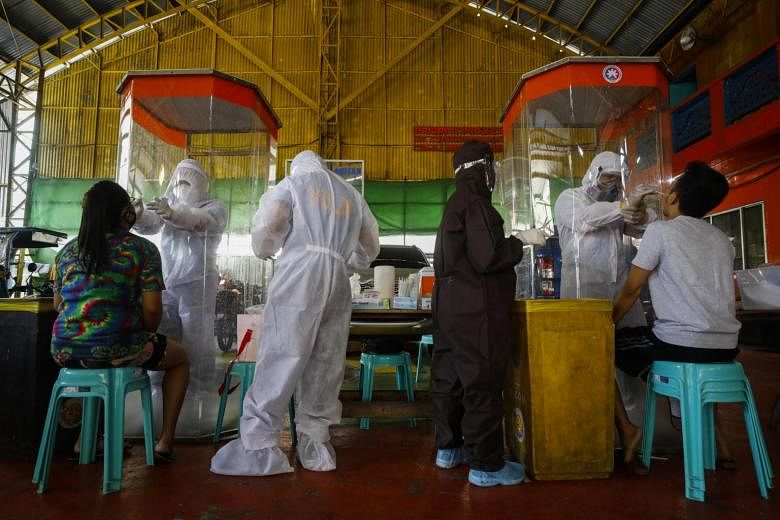MANILA - A more infectious strain of the coronavirus than the original one which first emerged in Wuhan has been detected in the Philippines' largest city, health officials said on Monday (Aug 17).
The G614 strain was detected in Quezon City, home to some 2.9 million people, Health Undersecretary Maria Rosario Vergeire told reporters.
The city has more than 8,000 cases of Covid-19, the disease caused by the virus.
The Philippine Genome Centre disclosed, in a bulletin for August, that G614 was found in nine samples randomly collected in Quezon City.
The G614 strain emerged out of the D614G mutation of the original D614 strain that was first reported in the Chinese city of Wuhan.
Dr Vergeire said the sample size was still too small to conclude that G614 had already spread in the Philippines.
"We still need a lot of evidence… The study was centralised and focused on Quezon City. It might not be a representative sample for the rest of the country," she said.
She added that there had not been any definitive study showing that G614 was more transmissible than D614.
A global study published in the journal Cell this month found that the mutation has made the virus more infectious, but does not seem to make people any sicker.
The researchers also concluded that G614 had become more common than the original strain in almost every nation and region they looked at, suggesting it might have already outcompeted D614.
But scientists in Britain estimated in a limited study that G614 spreads by only 1.22 times more than D614, not 10 times as some had claimed.
Malaysia on Sunday reported that the D614G mutation was detected in four cases from two Covid-19 clusters.
One cluster, in Bukit Tiram, Johor, involves a case imported from the Philippines.
"It's found to be 10 times more infectious and is easily spread by an individual 'super spreader'," health chief Noor Hisham Abdullah said in a Facebook post.
He added that the D614G mutation, discovered by scientists in July 2020, could render existing vaccine research incomplete or ineffective against the new strain.
President Rodrigo Duterte is expected later on Monday to lift a lockdown that has been in place in Metropolitan Manila since Aug 3, even though Covid-19 cases continue to top 3,000 a day and more than 500 people have been reported to have died this month alone.
The Philippines currently has the most number of infections in South-east Asia, with its caseload exceeding 161,000 as of Sunday. More than 2,600 people have died.
Dr Vergeire said health officials were monitoring 1,245 clusters, with 411 of these in Metro Manila.
Nearly all are in communities, she said. Clusters were also observed in hospitals and prisons.
Mr Duterte's spokesman Harry Roque said at a news briefing on Monday there had been an "intense debate" among the president's advisers between those who wanted to lift the lockdown to restart the economy and those who said it should be extended for at least two more weeks because the outbreak remained uncontrolled.
"I personally believe we need to learn how to live our lives with Covid. We need to reopen the economy. People will continue losing their jobs if we remain on lockdown," said Mr Roque.
A private survey showed that nearly half of adult workers in the Philippines were jobless last month. The unemployment rate at the end of 2019 was 2.15 per cent.
Experts from the state-run University of the Philippines are recommending a 15-day extension of the lockdown.
They said in their latest report that Covid-19 cases could be contained to 210,000 by the end of the month if strict shelter-at-home restrictions were kept in place for two more weeks.
A "premature" lifting of the lockdown could lead to at least 40,000 more cases, they warned.












